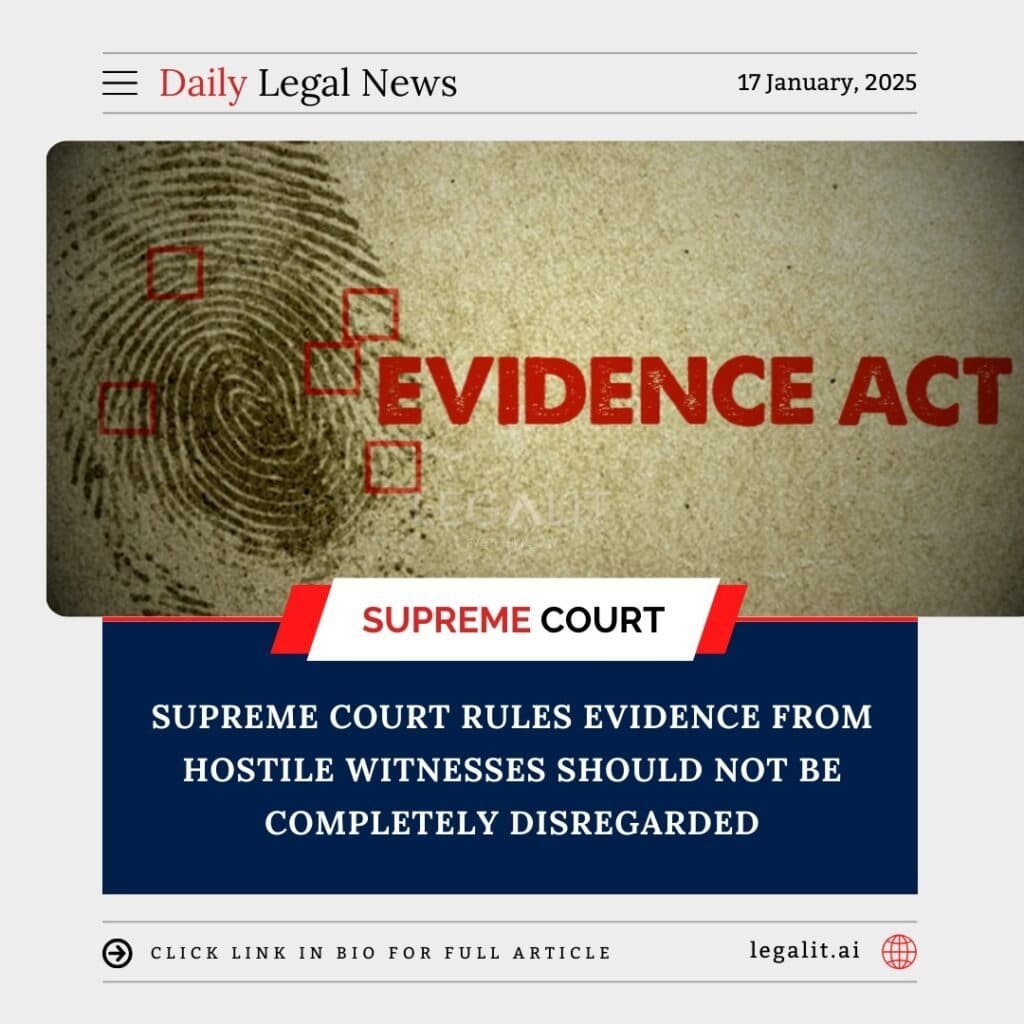
Background
In a significant ruling, the Supreme Court of India has stated that evidence provided by hostile witnesses need not be completely dismissed. This decision comes after considering a case where testimony given by a witness was inconsistent with their earlier statement, leading to the witness being declared hostile. The Court held that despite a witness being declared hostile, their testimony could still be admissible in certain circumstances, thus allowing for a more nuanced approach in dealing with such situations in criminal trials.
The case was related to a criminal appeal where the accused challenged the conviction based on statements from hostile witnesses. The appellant’s defense argued that since the witnesses had turned hostile, their statements should be entirely disregarded. However, the prosecution argued that even hostile witnesses could provide valuable evidence, which should not be completely discarded.
Court’s Rationale
The Supreme Court, in its judgment, emphasized the following key points:
- Relevance of Testimony: The Court stated that even when a witness turns hostile, it does not automatically invalidate their earlier statements. Instead, the credibility of the statement must be assessed in light of the entire context.
- Partial Use of Evidence: The Court noted that parts of the hostile witness’s testimony could still be used if corroborated by other evidence, or if it aligns with other factual findings in the case. This approach prevents the waste of potentially useful information that might inadvertently be dismissed.
- Testimonial Integrity: The Court also highlighted that hostile witnesses do not necessarily mean deliberate perjury or falsehood, as external pressures, misunderstandings, or lack of clarity may contribute to inconsistencies. Therefore, their statements should be evaluated thoroughly and critically.
- Judicial Discretion: Judges have the discretion to admit or exclude hostile witness testimony based on the overall facts and evidence. It is the responsibility of the judiciary to discern the parts of such testimony that may be useful to the case at hand.
Implications of the Judgment
This ruling has broad implications for the criminal justice system in India, as it addresses a fundamental issue in handling hostile witnesses in legal proceedings. Several points emerge from the judgment:
- Flexibility in Courtroom Proceedings: Courts now have greater flexibility in utilizing evidence from hostile witnesses. This may result in more comprehensive hearings and a more inclusive understanding of the case at hand.
- Preventing Miscarriages of Justice: By not outright dismissing hostile testimony, the ruling ensures that all evidence, regardless of the witness’s stance, is fully considered. This may prevent the risk of innocent individuals being wrongfully convicted or acquitted based on incomplete evidence.
- Impact on Future Trials: In future trials, judges will likely adopt a more careful approach when handling hostile witnesses, considering their testimony on a case-by-case basis rather than automatically discarding it. This might lead to more detailed and fair adjudication of criminal matters.
- Increased Reliance on Corroborative Evidence: The decision also highlights the need for corroborative evidence in criminal cases. Prosecution and defense teams must seek additional evidence to support or contradict the testimony of hostile witnesses, making the process more comprehensive and thorough.
Conclusion
The Supreme Court’s decision underscores the importance of a balanced and fair approach when dealing with hostile witnesses in Indian criminal law. It reinforces the idea that the judiciary should not exclude evidence solely based on the hostility of a witness but should examine it in its totality, considering corroborating factors. This ruling ensures that every piece of evidence is carefully evaluated before making judgments, thus enhancing the integrity of the judicial process.
The judgment will likely lead to more consistent and well-informed decisions in criminal cases involving hostile witnesses, as it establishes a clear framework for how such testimony should be treated. As the legal landscape evolves, this ruling may also inspire reforms aimed at improving witness protection and ensuring justice is not hindered by adversarial witness testimony.